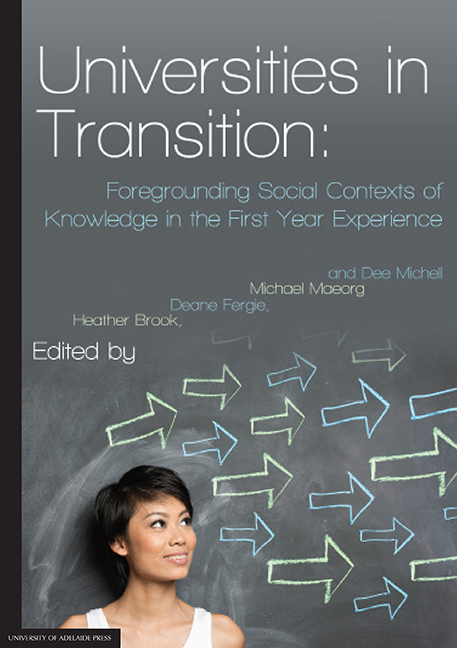Book contents
- Frontmatter
- Contents
- Notes on Contributors
- Introduction
- Part 1 Reconceptualising: transition and universities
- 1 Navigating student transition in higher education: induction, development, becoming
- 2 University transitions in practice: research-learning, fields and their communities of practice
- Part 2 Revaluing: ‘non-traditional’ student groups in higher education
- Part 3 Realising: transformations on campus
1 - Navigating student transition in higher education: induction, development, becoming
from Part 1 - Reconceptualising: transition and universities
Published online by Cambridge University Press: 05 December 2014
- Frontmatter
- Contents
- Notes on Contributors
- Introduction
- Part 1 Reconceptualising: transition and universities
- 1 Navigating student transition in higher education: induction, development, becoming
- 2 University transitions in practice: research-learning, fields and their communities of practice
- Part 2 Revaluing: ‘non-traditional’ student groups in higher education
- Part 3 Realising: transformations on campus
Summary
Abstract
Student transition into higher education (HE) has increased in importance in recent times, with the growing trend in OECD nations towards universal HE provision and the concomitant widening of participation to include previously under-represented groups. However, ‘transition’ as a concept has remained largely uncontested and taken for granted, particularly by practitioners but also by many researchers. Based on an analysis of recent research in the field, the chapter suggests three broad ways in which transition can be conceived and, hence, three approaches to managing and supporting student transition in HE: as (1) induction; (2) development; and (3) becoming. The third — transition as ‘becoming’ — offers the most theoretically sophisticated and student-sympathetic account, and has the greatest potential for transforming understandings of, and practices that support, transitions in HE. It is also the least prevalent and least well-understood. Apart from being explicit about how transition is defined, this chapter argues that future research in the field needs to foreground students' lived realities and to broaden its theoretical and empirical base if students' capacities to navigate change are to be fully understood and resourced.
Introduction
The focus of this chapter is on ‘transition’, specifically on how it is conceived in relation to students and higher education (HE). It is premised on the understanding that its different interpretations variously inform policy, research and practice in the field and that despite a growing level of interest in HE, transition remains a largely unconsidered concept.
Information
- Type
- Chapter
- Information
- Universities in TransitionForegrounding Social Contexts of Knowledge in the First Year Experience, pp. 13 - 40Publisher: The University of Adelaide PressPrint publication year: 2014
